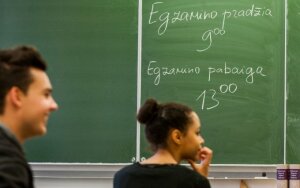- June 10, 2014
- 443
A Polish secondary school graduate put her Lithuanian peers to shame: A response to the claim that “We’re all going to pass the exam, after all, we’re not Poles.”

 DELFI (T.Vinicko nuotr.)
DELFI (T.Vinicko nuotr.)After reading several articles criticizing the matura exam, I decided to express my opinion on the subject. I’m a secondary school graduate of Polish descent and I’ve graduated from a Polish secondary school in Vilnius. Like most secondary school graduates, I took a “terrifying” English exam, as well as a Lithuanian/literature exam concerning “unknown authors” and a maths exam with “unsolvable” questions.
Let’s start with the English exam. I admit that the questions surprised me a little bit. I was expecting them to be easier. The listening part was particularly difficult; I realized I had made many mistakes, even though my average grade in English that year was 10. To be honest, I was disappointed, but I didn’t blame NEC (National Examination Centre), the cassette player, the teachers, or hot weather.
I realized that it was only my fault – it meant that I hadn’t prepared enough, I hadn’t worked hard enough during my twelve years of learning the language, and, at the end of the day, many students that were smarter than me deserved those 100 points more; I’ll settle with whatever grade I’ll get. I hoped for 70-80 points, which I don’t think is a bad score. Although the English exam was met with much negativity, it wasn’t too difficult; those who took it shouldn’t treat the NEC as a scapegoat responsible for their twelve years of idleness.
The next exam – Lithuanian/literature. I’d like to defend all Poles who were mocked in a Facebook group “dvyliktokas dvyliktokui” (loosely translated as “Helping Each Other Before the Matura Exam”). One could read there such claims as “We’re all going to pass the exam, after all, we’re not Poles.” I was furious upon reading those statements. Do we speak and read Lithuanian worse than Lithuanians? I’m sure we don’t. The Lithuanian language is, for all intents and purposes, our mother tongue; since we were born, we’ve been hearing it as often as Polish, our actual native language. During the exam, I realized I was right.
The topics were especially easy and all authors were well-known; I wrote a really good essay. I was surprised by many students of Lithuanian descent who complained that they didn’t know some of the authors mentioned on the exam. Then I realized we’re not worse than our Lithuanian peers; I’m proud of us, and to those students who mock Poles, I’d like to say: at least we are well-versed in Lithuanian literature, eagerly read it, and are able to write both essays on a subject of any Lithuanian author.
We are familiar with the works of Neither Maironis, V. Mačernis, or J. Kunčinas, and we’re not afraid of them. For that, we thank our wonderful teachers, who, in the teeth of reduced number of lesson periods, managed to teach us all and prepare us for the exams. Like in the last year, our school is expecting many “hundreds.”
And, finally, the commonly criticized maths exam. Since my final grade in maths was 10, I wasn’t afraid of the exam. I never took any private lessons, nor do I have any particular skills; I’ve been merely studying hard and trying to understand everything during those last 12 years. As a result, the exam didn’t seem too hard to me, but rather hard enough. The only thing I could take issue with is that there not enough time. This year, one could gain up to 69 points, so there were more questions yet no more time. Because of that, I made some mistakes; however, no question was unsolvable, everything was based on the curriculum. The only thing needed to pass the exam was to have been conscientiously working during the last 12 years.
My dear colleagues, let’s stop blame the system for our mistakes. Think: do you deserve good grades? Have you been working hard enough during the last 12 years? After all, higher education will be much more challenging; if you slipped up now, what will happen next? I wish you all more learning and less whining. Don’t forget that we are the architects of our own fortune.
The views expressed by the author may not represent the views of DELFI.
The article was originally written in Lithuanian and translated into English from the Polish translation (available here: http://pl.delfi.lt/aktualia/litwa/polska-maturzystka-zawstydzila-litewskich-abiturientow.d?id=64998451). To read this article in Lithuanian, click here (http://www.delfi.lt/pilietis/voxpopuli/dvyliktoke-lenkaite-sugedino-lietuviu-abiturientus.d?id=64992863).
Tłumaczenie by Michał M. Kowalski w ramach praktyk w Europejskiej Fundacji Praw Człowieka, www.efhr.eu. Translated by Michał M. Kowalski within the framework of a traineeship programme of the European Foundation of Human Rights, www.efhr.eu.


